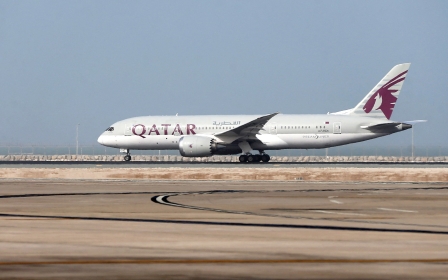Qatar World Cup stadium company ‘built Uyghur internment camp’

A Chinese construction firm that built the venue for the Qatar World Cup final previously built a prison used to detain Uyghur Muslims, according to a report in The Times.
The China Railway Construction Corporation (CRCC), which helped build the Lusail stadium in Doha, had previously worked for the Xinjiang Production and Construction Corps, a government body sanctioned for human rights abuses in the far west of the country, the London-based paper revealed on Thursday.
Last March, the European Union joined the US in sanctioning Corps leadership for “atrocious human rights violations”.
CRCC and the Qatar’s World Cup organising committee did not immediately respond to Middle East Eye's requests for comment on The Times' story.
Human rights concerns have hung over the Qatar World Cup, which starts on 20 November and is the first to be held in an Arab or Muslim country.
Several European nations have announced some form of boycott over the international competition, including the Danish football team, which revealed shirt designs that were made in protest against the conditions of migrant workers in Qatar.
A recent United Nations report said that China may be guilty of “crimes against humanity” in Xinjiang through the “arbitrary and discriminatory detention” of Uyghurs and other Muslim minorities.
The allegations, rejected angrily by China, were met with silence by Muslim-majority countries in the Middle East, North Africa and beyond, many of which are developing strong ties with Beijing.
Panda diplomacy
Qatar was this week criticised for indulging “panda diplomacy” after accepting two pandas - the first in the Middle East - as gifts from China.
Four-year-old “Suhail” and three-year-old “Thuraya” will live in Qatar for the next 15 years, in an indoor enclosure that supposedly replicates their natural habitat in Sichuan, China.
A day before they left, China's ambassador to Qatar, Zhou Jian, praised the bilateral relationship between the countries, adding that the gift symbolised the depth of their unity.
Conservationists have criticised the gesture as a political move that risks the health, safety and welfare of the animals.
Uyghur advocates say the move is an attempt to distract the world from the atrocities in Xinjiang province.
“China is trying to put a good face for other countries,” Aydin Anwar, a US-based Uyghur activist, told Middle East Eye.
“Qatar is one of those countries that has actually supported China’s policies towards the Uyghurs, so sending pandas to Qatar is not surprising."
Middle East Eye delivers independent and unrivalled coverage and analysis of the Middle East, North Africa and beyond. To learn more about republishing this content and the associated fees, please fill out this form. More about MEE can be found here.





